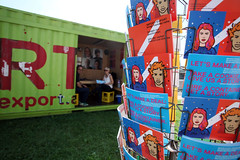Mistakes to Avoid When Exporting Your Brand

Mistakes to Avoid When Exporting Your Brand
Your brand is your main asset which distinguishes you from your competitors and represents your core values. A true global brand is recognised worldwide, conveying a company message which spans cultural boundaries. This is not easy to achieve, even businesses withhuge global appeal have made awkward mistakes.
Only a select few can honestly call themselves global brands, but selling to a foreign market is something experienced by businesses large and small. As your business grows, you may identify overseas markets,before you cross the border though, your brand needs a three point check over.
Core Values
Certain values are stronger in different markets. Be aware that any strong affiliations your brand has may be meaningless elsewhere. Promoting one brand quality more excessively than the others is perfectly acceptable, altering the brand is not.
For example, your brand is based in the UK and, among others, is an active supporter of animal charities, British people are famous animal lovers so this has served you well. If you want to enter a country who are not as animal friendly, it would make sense to focus on the other merits of your brand.
What you cannot do is enter a market who stand against your brand. A culture that hates animals (it probably doesn’t exist but it’s just an example)would be best left alone. This will damage your brand in both your home an export market.
Alter with your brand at your peril. If in doubt, it is best to create a new one.
Language Barrier
Check how your brand translates into your export market’s language.This is where many companies have failed to do their homework, with embarrassing consequences. The Mazda Laputa and Mitsubishi Pajero where exported to Spain, without realising that both these words had rude meanings in Spanish.
Words can also be misinterpreted when translated. The word ‘discount’ for example, has a generally positive interpretation in the UK, but could mean cheap or nasty when directly translated elsewhere.
If you have a slogan or strapline, it may have to be discarded altogether. It may translate into nonsense, especially with non-European languages. A pun will not translate into any other language, not without making you look stupid anyway
Legalities
Your brand will be registered and protected in your home country, but not in your adopted market. Check the new country’s business listings for anyone with a similar name to yours, if there is a clash you may need to make a supple adjustment.
When American retailer TJ Maxx entered the UK market, to avoid confusion with established brand TJ Hughes, they changed their name to TK Maxx. This was a wise move, even though TJ Hughes’ case would not have been strong, it is important to stand out in the crowd.
Author Bio: Joe Errington is a marketing executive for MITIE. A strategic outsourcing company who look after the facilities management of companies in the UK and abroad.

